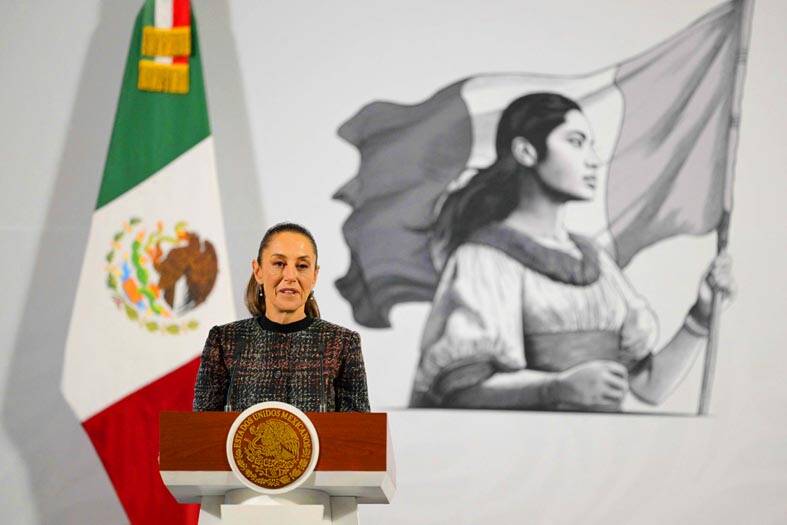US President Donald Trump on Saturday announced broad tariffs on major US trading partners Canada, Mexico and China, claiming a “major threat” from illegal immigration and drugs — a move that sparked promises of retaliation.
Canadian and Mexican exports to the US would face a 25 percent tariff starting tomorrow, although energy resources from Canada would have a lower 10 percent levy.
Goods from China, which already face various rates of duties, would see an additional 10 percent tariff.

Photo: AFP
Trump’s orders also suspended exemptions allowing low-value imports from the three countries to enter the US duty-free.
The announcement threatens upheaval across supply chains, from energy to cars to food.
Trump invoked the International Emergency Economic Powers Act in imposing the tariffs, with the White House saying that “the extraordinary threat posed by illegal aliens and drugs, including deadly fentanyl, constitutes a national emergency.”
The Chinese Ministry of Commerce said in a statement that it would take “corresponding countermeasures” and file a claim against Washington at the WTO.
Mexican President Claudia Sheinbaum announced that her country would impose retaliatory tariffs.
Sheinbaum said she had told her economy minister “to implement Plan B that we have been working on, which includes tariff and non-tariff measures in defense of Mexico’s interests.”
Canadian Prime Minister Justin Trudeau — who spoke with Sheinbaum — separately said his country would hit back with 25 percent levies of its own on select US goods worth C$155 billion (US$106.7 billion), with a first round tomorrow followed by a second one in three weeks.
“We’re certainly not looking to escalate, but we will stand up for Canada, for Canadians, for Canadian jobs,” he said, as he warned of a fracture in longstanding Canada-US ties.
Trump has repeatedly expressed his approval of tariffs as a policy measure, and has signaled that Saturday’s action could be the first volley in further trade conflicts to come.
Last week, he also pledged to impose duties on the EU.
He has also promised tariffs on semiconductors, steel, aluminum, oil and gas.

LONG FLIGHT: The jets would be flown by US pilots, with Taiwanese copilots in the two-seat F-16D variant to help familiarize them with the aircraft, the source said The US is expected to fly 10 Lockheed Martin F-16C/D Block 70/72 jets to Taiwan over the coming months to fulfill a long-awaited order of 66 aircraft, a defense official said yesterday. Word that the first batch of the jets would be delivered soon was welcome news to Taiwan, which has become concerned about delays in the delivery of US arms amid rising military tensions with China. Speaking on condition of anonymity, the official said the initial tranche of the nation’s F-16s are rolling off assembly lines in the US and would be flown under their own power to Taiwan by way

OBJECTS AT SEA: Satellites with synthetic-aperture radar could aid in the detection of small Chinese boats attempting to illegally enter Taiwan, the space agency head said Taiwan aims to send the nation’s first low Earth orbit (LEO) satellite into space in 2027, while the first Formosat-8 and Formosat-9 spacecraft are to be launched in October and 2028 respectively, the National Science and Technology Council said yesterday. The council laid out its space development plan in a report reviewed by members of the legislature’s Education and Culture Committee. Six LEO satellites would be produced in the initial phase, with the first one, the B5G-1A, scheduled to be launched in 2027, the council said in the report. Regarding the second satellite, the B5G-1B, the government plans to work with private contractors

MISSION: The Indo-Pacific region is ‘the priority theater,’ where the task of deterrence extends across the entire region, including Taiwan, the US Pacific Fleet commander said The US Navy’s “mission of deterrence” in the Indo-Pacific theater applies to Taiwan, Pacific Fleet Commander Admiral Stephen Koehler told the South China Sea Conference on Tuesday. The conference, organized by the Center for Strategic and International Studies (CSIS), is an international platform for senior officials and experts from countries with security interests in the region. “The Pacific Fleet’s mission is to deter aggression across the Western Pacific, together with our allies and partners, and to prevail in combat if necessary, Koehler said in the event’s keynote speech. “That mission of deterrence applies regionwide — including the South China Sea and Taiwan,” he

‘NARWHAL’: The indigenous submarine completed its harbor acceptance test recently and is now under heavy guard as it undergoes tests in open waters, a source said The Hai Kun (海鯤), the nation’s first indigenous defense submarine, yesterday began sea trials, sailing out of the Port of Kaohsiung, a military source said. Also known as the “Narwhal,” the vessel departed from CSBC Corp, Taiwan’s (台灣國際造船) shipyard at about 8am, where it had been docked. More than 10 technicians and military personnel were on deck, with several others standing atop the sail. After recently completing its harbor acceptance test, the vessel has started a series of sea-based trials, including tests of its propulsion and navigational systems, while partially surfaced, the source said. The Hai Kun underwent tests in the port from